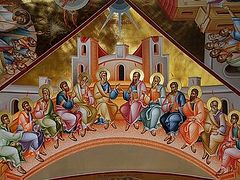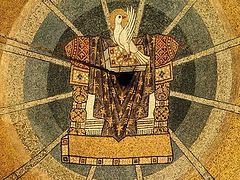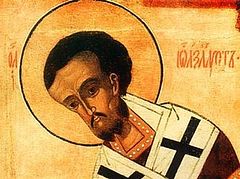This great feast of Pentecost is an inseparable continuation of the Lord’s Cross and Resurrection and Ascension to the right hand of the Father, in which the Holy Spirit is poured out upon the Church, recalling to mind the words of our Savior, and guiding our steps towards perfection in Christ. On this great feast we offer the words of two inspiring voices from St. Tikhon’s Monastery and Seminary in South Canaan, PA—those of Archimandrite Sergius, the abbot of St. Tikhon’s Monastery, and of Abp. Michael (Dahulich) of New York and New Jersey, rector and professor at St. Tikhon’s Seminary:
Dearly Beloved of God,
We are reminded by the Holy Fathers of our Church that “without the Holy Spirit, God’s commandments are beyond man’s conception and beyond his power to fulfill.” Consequently, “our salvation is not accomplished through faith only, nor through good works, but springs from the indwelling of the Holy Spirit in both soul and body.” (Fr. Zacharias, Man the Target of God, pg. 191.)
It is our task then to ceaselessly invoke the aid, help and indwelling of the Holy Spirit. This is our task as Orthodox Christians: to become the abode of the Holy Trinity. And how do we do this? By opening ourselves to the Grace of the Most Holy Spirit which is given at Pentecost, the gift of Grace that will abide with us forever (John 14:16.)
It is through this gift that we are empowered not only to be Christians, to believe the Truth through Grace, but also to do the “greater work” promised by the Lord. Our calling and task is not of this world and we are not expected to carry it out by our own efforts. Ours is to offer ourselves, our poverty, our hope and our life to the One Who is able to do abundantly above all that we ask or think. The Feast of Holy Pentecost again offers us the reminder: Without the Lord and His All Holy Spirit we can do nothing (John 15:5).
The Great Gift of the Comforting Holy Spirit was poured out on the Day of Holy Pentecost and was foretold by the prophets of old and by our Lord Himself. It was His promise to be with us always through this same Holy Spirit, even to the end of the world. Let us renew the indwelling of this Most Holy Spirit through our repentance, our sincere sacramental confession, and by uniting ourselves to the Most Holy Body and Blood of our Lord God and Savior Jesus Christ. Let us liken ourselves to God through the life that we live so that the Holy Spirit will “come and abide in us, cleanse us from every impurity and save our souls.” Wishing you a blessed Feast of Holy Pentecost and blessed summer season, we remain,
Fr. Archimandrite Sergius
Abbot of St. Tikhon's Monastery
and the Monastery Brotherhood
* * *
Archpastoral Letter of His Eminence Archbishop Michael,
For the Feast of Holy Pentecost 2016 Sunday, June 19, 2016
Beloved Concelebrants at the Holy Altar and Dear Brothers and Sisters in the Lord:
Christ is in our midst! He is and ever shall be!
Today we celebrate the Feast of Pentecost, the Birthday of our Holy Orthodox Church! It is also the holy day that enables us to understand God as the Holy Trinity. But most importantly, it is the commemoration of the Descent of the Holy Spirit upon the Apostles in the form of fiery tongues.
One might ask the question, just exactly who is the Holy Spirit? The Holy Spirit is the third Person of the Holy Trinity, of the same essence and of equal rank as the Father and the Son. We find that the Holy Spirit as God is revealed in many verses of Scripture; for example: Go, make disciples of all nations, baptizing them in the Name of the Father and the Son and the Holy Spirit... (Matthew 28:19) ... Why has Satan filled your hearts to lie to the Holy Spirit... you have not lied to men, but to God (Acts 5: 3-4) ... There are varieties of gifts, but the same Spirit... the same Lord ... it is the same God (I Cor. 12: 5) ... The grace of our Lord Jesus Christ, and the love of God the Father, and the communion of the Holy Spirit be with all of you (II Cor. 13:13) ... And the Spirit is the witness, because the Spirit is the truth (I John 5: 7-8).
The Godhead of the Holy Spirit comes directly from the Father. Just as the Son is begotten of the Father, so the Holy Spirit proceeds from the Father. Christ said, When the Comforter (the Holy Spirit) comes, Whom I will send to you from the Father, even the Spirit of Truth, Who proceeds from the Father, He will bear witness to Me (John 15:26). The Church has proclaimed that the Holy Spirit is of the same essence with the Father and the Son in the Trinity. The Church has enshrined this truth in the Nicene Creed, pronounced by the Second Ecumenical Council in 381. It states: "And (I believe) in the Holy Spirit, the Lord, the Giver of Life, Who proceeds from the Father, Who together with the Father and the Son is worshipped and glorified, Who spoke by the prophets."
The Holy Spirit abides in the Church, protects and preserves Her truths, and sanctifies Her members. The Holy Spirit is the Power and Comforter of the believers, as Christ promised. Being the third Person of the Holy Trinity does not mean that the Holy Spirit is not equal in essence to the Father and the Son. Rather, the Spirit is the life-giving energy and power making the Church the pillar and ground of the truth (I Tim. 3:15). The Holy Spirit was the divine instrument in the Incarnation of the Son of God, in the Birth of Jesus Christ as the God-Man: The Holy Spirit will come upon you (the Virgin Mary) and the power of the Most High will overshadow you; therefore, the Child to be born of you will be called Holy, the Son of God (Luke 1:35).
The Holy Spirit is the Author of the Bible and the Source of inspiration for its writers through the centuries. That is why the Scripture, though it was written by different persons and in different eras over the span of a thousand years, is coherent and consistent in its substance and its meaning. There is no other literature in the history of the world which has this outstanding coherence, while penned over such a long period of time and by different writers. What was prophesied in the Old Testament, dating back hundreds of years, was fulfilled in time, and in exact detail, in the New Testament—a process of divine promise and its realization over the course of time, guided by the Holy Spirit. This was not because of any change in the Truth, but because of its development for human acceptance, for when the fullness of time had come, God sent forth His Son ... and God has sent the Spirit of His Son into our hearts (Gal. 4:4-6).
Likewise, the decisions of the seven Ecumenical Councils on the teachings of our Orthodox Faith were inspired and guaranteed by the Holy Spirit. At each of these Councils, the Holy Fathers used the same formula of proclamation of our faith, as was pronounced at the Apostolic Council of Jerusalem in 49 A.D.: It seemed good to the Holy Spirit and to us ... (Acts 15:28).
The Holy Spirit throughout the centuries revealed divine truths and inspired chosen prophets, apostles and saints to spread and proclaim those truths to all peoples of the inhabited earth. It was in the design of Almighty God that those personalities would be indispensable in teaching and preaching—not proclaiming their own ideas or philosophies, but using their own abilities, inspired by the Holy Spirit, to serve the will of God. The prophets, apostles, and all the saints considered themselves instruments of the Holy Spirit, speaking with His authority, just as Christ said to the Twelve Apostles: Receive the Holy Spirit (John 20:22).
The "gift" of the Holy Spirit that we have received is not a static one, but a transforming and sanctifying power leading human beings to accomplish the will of God. The Church's leaders are exhorted: Take heed to yourselves and to all the flock, in which the Holy Spirit has made you guardians, to feed the Church of the Lord (Acts 20:28). This "gift" of the Holy Spirit is given to both the clergy and the laity who belong to the true Church in the Sacrament of Chrismation, our personal Pentecost, following Baptism (our personal Pascha). The Spirit gives to each of us His fruits: love, joy, peace, forbearance, kindness, goodness, faithfulness, gentleness and self-control (Gal. 5:22).
It is the Holy Spirit Who endows members of the Church with varieties of spiritual gifts for their illumination and sanctification. The faithful Orthodox Christian invokes the Holy Spirit in times of both joy and sorrow to strengthen his faith, to accomplish his purpose in life. He should humbly pray that he will not be led astray by "movements" outside the Church, where there is no salvation. Our dire need today is that we reawaken to realize that we already possess the greatest spiritual gift—our Orthodox Christian Faith.
On this glorious Feast of Pentecost, we Orthodox Christians must dedicate ourselves to the true living out of our faith in God, and not allow ourselves to stray away in moments of weakness. The Holy Spirit bestows gifts on those who believe and practice the faith delivered once for all to the Saints (Jude 1:3). As members of His Church, we are admonished to Pray at all times in the Spirit... with all prayer and supplication ... To that end keep alert with all perseverance (Ephesians 6:18) to the glory of the God Who loves us more than we love ourselves—the Father, the Son and the Holy Spirit, the One True God glorified in the Holy Trinity.
Assuring each of you of my humble prayers, my archpastoral blessing and my sincere love, I remain
Devotedly yours in His service,
+ MICHAEL
Archbishop of New York and the Diocese of New York and New Jersey




